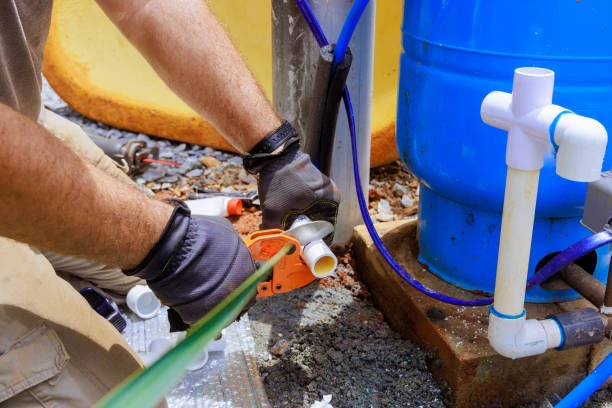PVC water pipe fittings connect and redirect pipes in plumbing systems. PVC Water Pipe Fittings are made from polyvinyl chloride (PVC), a durable and cost-effective plastic material.
Common Uses
- Residential plumbing
- Irrigation systems
- Industrial piping
Why Are They Popular?
PVC fittings are lightweight, easy to install, and resistant to corrosion.
Concerns Highlighted in the New Report
Chemical Leaching
The report highlights the risk of PVC fittings leaching harmful chemicals into drinking water.
- Phthalates and BPA: These substances, used to soften PVC, may disrupt hormonal functions.
- Vinyl Chloride: A carcinogenic compound sometimes detected in poorly manufactured PVC.
Microplastic Contamination
PVC degradation can release microplastics, polluting water supplies and harming aquatic ecosystems.
Temperature Limitations
PVC fittings may not handle high temperatures effectively, leading to potential failure in hot water systems.

Health Risks Associated with PVC Water Pipe Fittings
Toxic Exposure
- Prolonged exposure to leached chemicals may lead to health problems, including liver and kidney damage.
- Chlorine residues in PVC fittings could contribute to respiratory issues.
Impact on Children and Pregnant Women
- The report suggests that children and pregnant women are particularly vulnerable to toxins from PVC fittings.
Environmental Concerns
Non-Biodegradable Material
PVC fittings do not decompose naturally, contributing to landfill waste.
Production Hazards
Manufacturing PVC releases greenhouse gases and toxic chemicals into the atmosphere.
Disposal Challenges
Improper disposal of PVC fittings can lead to environmental contamination.
Performance Limitations
Cracking Under Pressure
PVC fittings may crack or fail under high water pressure, especially in older systems.
UV Degradation
Exposure to sunlight weakens PVC, causing brittleness and reducing its lifespan.
Not Suitable for Hot Water
PVC fittings often fail in systems with prolonged exposure to hot water.
What the Experts Say
Regulatory Concerns
Some regions have stricter regulations on PVC usage due to its potential risks.
Recommendations for Alternatives
Experts recommend using safer materials like PEX or HDPE for sensitive applications.
Safer Alternatives to PVC Water Pipe Fittings
PEX Fittings
PEX is flexible, durable, and safe for both hot and cold water systems.
HDPE Fittings
HDPE provides excellent chemical resistance and is more environmentally friendly.
Copper Fittings
Copper is naturally antimicrobial and highly durable, making it ideal for potable water systems.
How to Mitigate Risks When Using PVC Fittings
Regular Inspections
Inspect PVC fittings for cracks, discoloration, or wear to prevent failures.
Avoid High Temperatures
Use PVC only in cold-water systems to minimize warping and chemical leaching.
Opt for Certified Products
Choose PVC fittings that meet safety and quality standards to reduce risks.
Proper Disposal
Recycle old fittings responsibly to minimize environmental impact.
Key Takeaways from the Report
- PVC water pipe fittings pose potential risks to health and the environment.
- Safer alternatives like PEX, HDPE, and copper offer better performance and safety.
- Consumers must remain informed and consider safer options for plumbing needs.
Conclusion
The safety of PVC water pipe fittings remains a critical issue. While they offer affordability and convenience, the risks of chemical leaching, environmental damage, and performance limitations cannot be ignored. Exploring alternatives and adopting responsible practices can help address these concerns. Making informed decisions will ensure safer plumbing solutions for all.
FAQs
1. Are PVC water pipe fittings safe for drinking water?
PVC fittings meeting quality standards are generally safe, but concerns about chemical leaching exist.
2. Can PVC fittings handle hot water?
No, PVC is not recommended for hot water systems as it may warp or fail under high temperatures.
3. How can I dispose of old PVC fittings?
Recycle them at facilities that accept PVC or follow local waste disposal guidelines.
4. What are the best alternatives to PVC water pipe fittings?
PEX, HDPE, and copper fittings offer safer and more durable options.
5. How can I reduce risks when using PVC fittings?
Choose certified products, inspect them regularly, and use them only in appropriate applications.